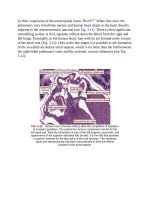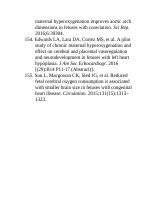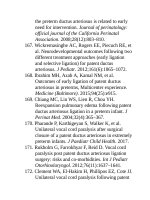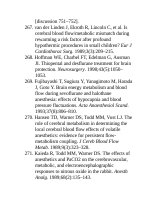Andersons pediatric cardiology 1781
Bạn đang xem bản rút gọn của tài liệu. Xem và tải ngay bản đầy đủ của tài liệu tại đây (80.56 KB, 3 trang )
▪Echocardiogram
▪Cardiaccatheterization(hemodynamics,anatomy)
▪MRI/MRAorCTangiography(anatomy)
▪Exercisetest
▪Vascularultrasound
▪Bloodgroup
▪Humanleukocyteantigenantibodytesting
▪Chemistry
▪Renalfunction
▪Liverfunction
▪Lipidprofile
▪Immunoglobulins
▪Hematology
▪Infectiousserologies
Followingathoroughreviewofthepatient'sdata,consultations,and
psychosocialassessment,theinterdisciplinaryteamwilldetermineifthepatient
isanappropriatetransplantcandidate,notanappropriatecandidate(e.g.,“too
well”or“toosick”),oriffurthertestingorconsultationsarerequiredtomakea
determination.
Indications
Therearenoabsoluteindicationsfortransplantationoftheheartduring
childhood,giventhewidevariabilityincardiacdiagnosesandpathophysiology.
Indicationscanbebroadlydividedintotwogroups,eitherlifesaving(Box67.2)
orlife-enhancing.Life-enhancingindicationsincludetreatmentofexcessive
disability;unacceptablypoorqualityoflife,usuallyinthesettingofpoor
myocardialfunction;complexunoperatedcongenitalheartdisease;andfailed
surgicaltreatment.Updatedguidelinesforlistingforcardiactransplantationhave
recentlybeenpublishedbytheISHLT.21
Box67.2
LifesavingIndicationsforHeart
Transplantation
▪End-stagemyocardialfailuredueto
▪Cardiomyopathyormyocarditis
▪Congenitalheartdisease
▪Postcardiotomyheartfailure
▪Malignantarrhythmiasrefractorytomedicaltherapy
▪Complexcongenitalheartdiseasewithnooptionsforsurgicalpalliationat
anacceptablerisk
▪Unresectablecardiactumorscausingobstructionorventriculardysfunction
▪Unresectableventriculardiverticula
Contraindications
Thecontraindicationstohearttransplantationduringchildhoodincludefixed
pulmonaryhypertension,pulmonaryvenousatresiaorprogressivestenosis,and
severehypoplasiaofthepulmonaryarteriesorthethoracicaorta.Other
contraindicationsincludeirreversiblefailureofmultipleorgans,aprogressive
systemicdiseasewithearlymortalityindependentofcardiacfunction,active
infection,malignancy,morbidobesity,diabetesmellituswithend-organdamage,
hypercoagulablestates,andseverechromosomal,neurologic,orsyndromic
abnormalities.Complicatingfactorsthatarenolongerconsidered
contraindicationstohearttransplantationincludemultispecificandhigh
sensitizationtohumanleukocyteantigen(HLA);intellectualdisabilities;
complexcongenitalcardiacdiseasesuchasabnormalitiesofatrialarrangement;
systemicvenousabnormalities;anomalouspulmonaryvenousdrainagewithout
stenosisandsomepulmonaryarterialanomalies;previoussternotomyor
thoracotomy;reversiblepulmonaryhypertensionormoreminornoncardiac
congenitalabnormalities;kyphoscoliosiswithrestrictivepulmonarydisease;
nonprogressiveorslowlyprogressivesystemicdiseaseswithlifeexpectancies
intothethirdorfourthdecade,suchasgeneticormetaboliccardiomyopathies;
anddiabetesmellituswithoutend-organdamage.
Elevatedpulmonaryvascularresistancehistoricallyhasbeenanindependent
riskfactorfordeathbothearlyandlateaftertransplantation.22,23Thethreshold
precludingtransplantationispoorlydefined,sincethereisacontinuumof
increasingriskaspulmonaryvascularresistancerises.Byconvention,a
pulmonaryvascularresistanceofgreaterthan6Woodunitspermetersquared
hasbeenconsideredacontraindicationbasedonhistoricaldata.22,23These
studies,however,showedthatitisthereactivityofthevascularbed,asopposed
totheabsolutemeasureofresistance,thatiscorrelatedwithoutcome.Thereisa
role,therefore,fortestingpulmonaryvasoreactivityaspartoftheassessment
priortotransplantation.Nonetheless,accurateassessmentofpulmonaryvascular
resistanceand/orvasoreactivitywithanydiagnosisoffunctionallyuniventricular
physiology,somecomplexmalformationswithvariablesourcesofflowofblood
tothelungs,orrestrictivecardiomyopathymaybechallenging.Morerecentdata
shownodifferenceinmortalityinpatientwithelevatedpulmonaryvascular
resistance.24,25









